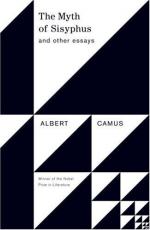
|
| Name: _________________________ | Period: ___________________ |
This test consists of 15 multiple choice questions and 5 short answer questions.
Multiple Choice Questions
1. What binds a man to the absurd?
(a) His consciousness of it.
(b) Philosophy.
(c) His sentient nature regarding death.
(d) His intelligence.
2. What comment does Camus make concerning suffering?
(a) It must be endured.
(b) It is ennobling.
(c) It should be avoided.
(d) It is useless.
3. According to Camus, what is an important relationship between The Trial and The Castle?
(a) Both novels have a hedonistic main character who denies theism.
(b) The Trial presents a problem which The Castle partly solves.
(c) The novels have the same central character and each is based on a play by Shakespeare.
(d) The Trial shows us the end of life and The Castle shows us Heaven.
4. How is Oedipus' fate announced?
(a) Supernaturally.
(b) Superbly.
(c) By means of a letter device.
(d) As a result of gossip.
5. Who was Adrienne Lecouvreur?
(a) Voltaire's mistress.
(b) A French composer of operetta.
(c) A French philosopher.
(d) A French actress.
6. Who is the hero of Metamorphosis?
(a) Joseph K.
(b) Samsa.
(c) Samson.
(d) Michael K.
7. Who liberated Death?
(a) The messenger of the gods.
(b) The god of war.
(c) Eurydice.
(d) Persephone.
8. What is important about an actor's fame?
(a) Ultimately it brings displeasure.
(b) The problem of paparazzi.
(c) Its fleeting nature.
(d) Its illusory nature.
9. When did Sisyphus test his wife's love?
(a) On their wedding night.
(b) When he returned from his travels.
(c) When he was close to death.
(d) As he was leaving on his travels.
10. Why does Chestov think we turn to God?
(a) To have the feling that 'underneath are the everlasting arms'.
(b) Because we are afraid.
(c) Only to gain favors.
(d) Only to obtain the impossible.
11. What does Camus suggest happens in bad novels?
(a) Dialogue is poorly written and often inappropriate to character.
(b) There is too much emphasis on structure.
(c) There is substantial over-writing, especially with descriptive passages.
(d) Thought becomes more important than style.
12. Once, how were the condemned spared the sight of the scaffold?
(a) The condemned person was blindfolded.
(b) Priests held a little painted screens in front of the condemned person's face.
(c) The execution chamber was never lit.
(d) The condemned person walked backwards, with two priests assisting.
13. What does Oedipus' remark imply?
(a) That fate is a human matter, to be settled among men.
(b) That in certain circumstances, you might negotiate with the gods.
(c) That fate is decided prior to birth.
(d) That fate is cruel and will defeat you despite your pure nature.
14. What is the legendary Faust remembered for?
(a) Selling his soul to the Devil.
(b) As an alchemist.
(c) Living for a very long time.
(d) Killing his mistress.
15. Which philosopher claims that anxiety is at the source of everything?
(a) Heidegger.
(b) Sartre.
(c) St. Augustine.
(d) Aristotle.
Short Answer Questions
1. Which famous Frenchwoman was self-reliant?
2. What technique is employed by philosophical novelists?
3. What does Camus see as an almost inevitable companion to passion?
4. What embodies 'a drama of the intelligence', according to Camus?
5. How was the god Mercury involved in the Sisyphus story?
|
This section contains 546 words (approx. 2 pages at 300 words per page) |

|




